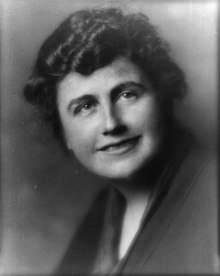My Memoir
Edith Bolling Wilson | |
| Publisher | Bobbs-Merrill Company |
|---|---|
Publication date | 1938 |
| Pages | 386 |
| 973.91/3/092 B | |
My Memoir is a 1938 memoir by Edith Wilson, a First Lady of the United States and the wife of Woodrow Wilson. She wrote the book as an apologia to defend her husband from perceived attacks, and to preserve his legacy. Critics generally considered the book to be "delightful" as a "collection of episodes", but especially those writing at publication predicted it would be of little historical value except for its account of Woodrow Wilson's stroke and last days in office. However it has been used by academic historians in the late 20th and early 21st centuries to examine a variety of topics related to Edith Wilson.
Background

Publication
Wilson wrote the memoir and picked Woodrow's first biographer,
My Memoir was reprinted in 1993.[8]
Reception
A contemporary review in
In 2001, Bruce Clayton, writing in The Atlanta Journal-Constitution, described the memoir as a "self-serving apologia".[16] Slagell and Zaeske conclude that although the book has "numerous inaccuracies due to the fact it was written two decades after the events it described and was highly romanticized, it remains the most revealing source we have about the closing days of the Wilson administration." It presents Edith in a very positive light yet also tied her importance directly to her husband, ending when he died in 1924.[5] Phyllis Lee Levin attributes to Edith and her memoir the creation of a public opinion of that "mythologiz[ed] her husband's goals and reputation as ennobled prophet, warrior, and statesman."[17]
References
- ^ William Elliott Hazelgrove, Madam President: The Secret Presidency of Edith Wilson (Washington, D.C.: Regency Publishing, 2016); Brian Lamb, Who's Buried in Grant's Tomb?: A Tour of Presidential Gravesites (New York: Public Affairs, 2010), p. 119; Judith L. Weaver, "Edith Bolling, Wilson as First Lady: A Study in the Power of Personality, 1919–1920," Presidential Studies Quarterly 15, No. 1 (Winter, 1985), pp. 51–76; and Dwight Young and Margaret Johnson, Dear First Lady: Letters to the White House: From the Collections of the Library of Congress & National Archives (Washington, D.C.: National Geographic, 2008), p. 91.
- ^ Markel, Howard (October 2, 2015). "When a secret president ran the country". PBS NewsHour. NewsHour Productions. Retrieved December 27, 2019.
- ^ Marty, Myron A. (October 24, 2001). "President Wilson's Character Flaws and Protective Wife Are Examined". The St. Louis Post-Journal – via ProQuest.
- ^ "Edith Bolling Wilson Birthplace Papers Finding Aid". Woodrow Wilson Presidential Library & Museum. Retrieved November 21, 2020.
- ^ ISBN 978-0-7425-2971-7.
- ^ ISSN 1937-5239.
- ^ "Edith Bolling Galt Wilson". The White House. Retrieved November 21, 2020.
- JSTOR 41416048.
- JSTOR 26449941.
- .
- .
- ^ Thompson, Ralph (March 13, 1939). "Books of the Times: Gender Not Smart The Solid Virtue". The New York Times.
- JSTOR 41416048. Retrieved January 7, 2021.
- ISSN 0882-228X. Retrieved January 7, 2021.
- JSTOR 27550164. Retrieved January 7, 2021.
- ^ Clayton, Bruce (September 30, 2001). "Our first woman president 'Edith and Woodrow' details the first lady's pivotal role after her husband's stroke". The Atlanta Journal-Constitution – via ProQuest.
- S2CID 144913911.
